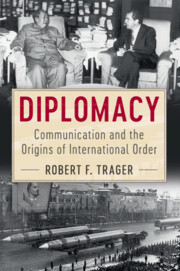Preface
Published online by Cambridge University Press: 25 October 2017
Summary
The aim of this book is to show how a few inferential logics explain most of what diplomats and leaders learn from their conversations. In ever denser networks of diplomatic exchange, across diverse contexts in the international system, time and again, fundamentally similar dynamics recur. The conclusions that state representatives reach shape decisions for war and how they understand the international order of the day.
The earliest elements of the argument evolved out of thinking about the trepidation with which diplomats and state leaders make demands. Often, their principal concern is not that their threats will not be believed, but what will happen when they are. This is common to alliance politics and nuclear brinkmanship, to attempts to deter and attempts to compel. It is important because the reasons some demands are not made, and others are not made lightly, are also the reasons they are meaningful at all. The fact that a leader does not hold back, in spite of reasons to do so, shows just how important an issue is.
“Obviously,” US President John F. Kennedy told his advisors during the Cuban Missile Crisis, “you can't sort of announce that in four days from now you're going to take [the missiles] out.” Why–what prevented this threat of attack in four days from being made? Was it that the threat might not be credible? No. Such a threat could not be made lightly because of the escalatory dynamic that could result when the Soviets took the threat seriously, because “they may announce within three days that they're going to have [nuclear] warheads on them.” Kennedy worried about what the Soviets would do in response precisely because they would find the threat credible. This was a form of brinkmanship, but it could be carried on through private meetings and telegraph messages, and the danger was not of an accidental slide into conflict, but of what the sides would do intentionally in response to new information from their adversaries.
At a far removed time and place and in a different international context, German Chancellor Otto von Bismarck was loath to make even the subtlest diplomatic threat to Russia, even over an issue he considered essential to German security.
- Type
- Chapter
- Information
- DiplomacyCommunication and the Origins of International Order, pp. xi - xivPublisher: Cambridge University PressPrint publication year: 2017



